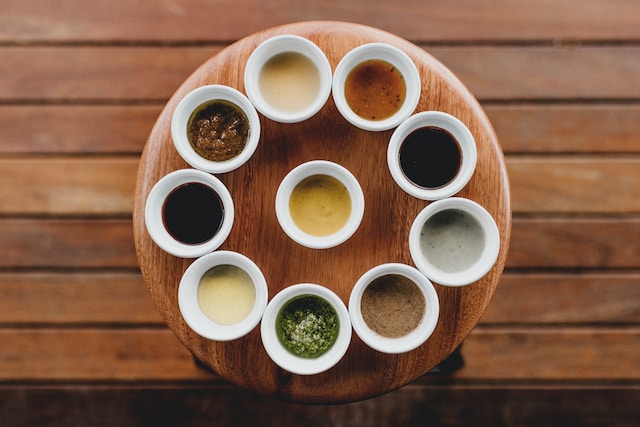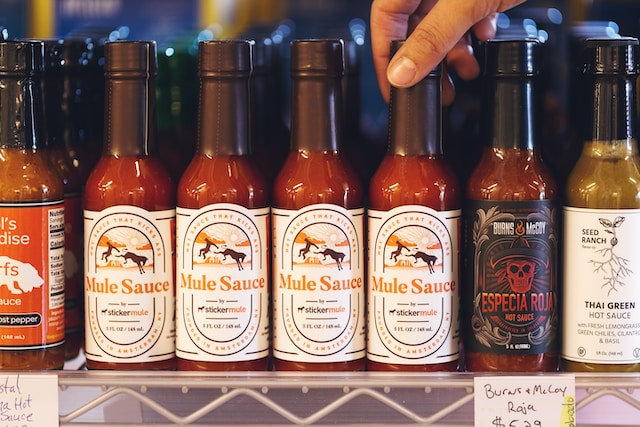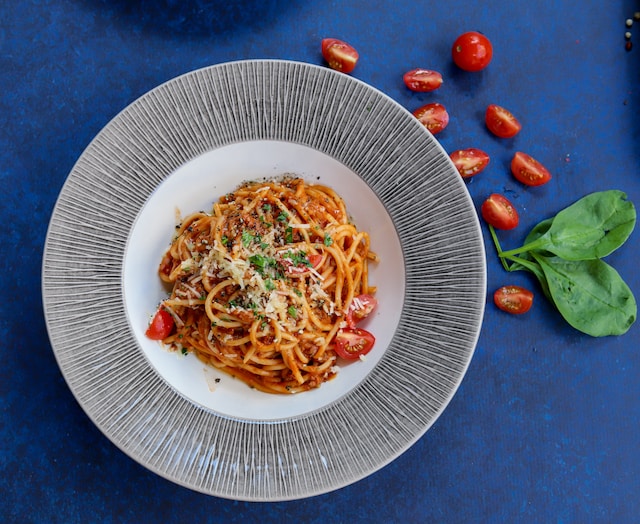Imagine biting into your favorite dish. What makes it so appealing? Is it the blend of ingredients, the way it’s cooked, or perhaps, the sauce that brings it all together? Sauces, often underappreciated, play a pivotal role in elevating the taste of our meals. This article delves into the transformative power of sauces, their ability to amplify flavors, and how they pair with various types of food to create culinary masterpieces. Whether you’re a novice cook or a seasoned chef, understanding the impact of sauces can truly make your dish more delicious. So, do you think sauce can make your dish more delicious? Let’s find out together.
What Are Sauces?
Before diving into the details, let’s first understand what sauces are. In simple terms, sauces are a liquid or semi-liquid condiment that is used to add flavor, moisture, and visual appeal to a dish. They can be served hot or cold and can range from thin and watery to thick and creamy consistency.
Sauces have been an integral part of cooking for centuries. They are believed to have originated in ancient civilizations such as Rome, Greece, and China, where they were used to enhance the taste of bland dishes or mask spoiled food. Over time, sauces evolved into an art form, with different cultures developing their own unique blends and recipes.
Home-made Sauces Or Bought?
With the rise of convenience and pre-packaged foods, it’s easy to grab a bottle of ready-made sauce from the supermarket. While these sauces may save time and effort, they often contain preservatives, added sugars, and other unhealthy ingredients. On the other hand, homemade sauces allow you to control the quality and quantity of ingredients used.
Not only that, but homemade sauces also have the advantage of being customizable. You can adjust the flavors, textures, and spice levels to suit your taste preferences. Plus, there’s something special about creating a sauce from scratch that adds an extra layer of love and care to your dish.
There are various brands of sauces such as ketchup, mayo, barbecue, and hot sauce that have become household names. However, these sauces often contain high amounts of sugar, salt, and unhealthy fats. That’s why it’s important to read the labels carefully and choose sauces with natural ingredients.
Food manufactures such as Primal Kitchen and Sir Kensington’s offer a range of healthier and tastier sauces made with real, organic ingredients. Alternatively, you can experiment with making your own sauces at home using fresh herbs, spices, and natural sweeteners.
The ‘norm’ of condiment brands include, Heinz, Hellman’s, Sweet Baby Ray’s and Frank’s RedHot. Some of the healthier options include, Primal Kitchen, Sir Kensington’s and Tessemae’s.
Powered Sauces?
Gravy granules, stock cubes or bouillon powder are examples of powdered sauces. While they may seem like a quick fix for adding flavor to dishes, they often contain high amounts of sodium and other additives that can be harmful in the long run. Moreover, these powdered sauces lack the depth and complexity of flavors that homemade sauces offer.
If you’re short on time, it’s better to opt for low-sodium broth or stock instead of using powdered sauces. You can also make your own stock at home and freeze it in ice cube trays for convenient use.
MSG?
MSG (monosodium glutamate) is a flavor enhancer commonly used in processed foods and sauces. Often associated with causing headaches, nausea, and other health issues, MSG has received a lot of backlash over the years. While the FDA classifies it as safe for consumption, many people are sensitive to MSG and may experience adverse reactions.
MSG is practically a man-made salt, created by extracting sodium from the naturally occurring amino acid glutamate. It’s used to enhance the umami (savory) taste in foods and is often found in Asian sauces such as soy sauce, oyster sauce, and hoisin sauce.
However, not all hope is lost for MSG lovers. There are now several brands that offer MSG-free or low-MSG options of sauces, making it possible for everyone to enjoy their favorite dishes without any negative effects.
The Magic Of Sauces In Enhancing Flavors
Now that we’ve established the importance of sauces let’s talk about how they can make your dish more delicious. Sauces are like a secret ingredient that has the power to transform an ordinary dish into something extraordinary.
One of the primary ways sauces enhance flavors is by adding depth and complexity. For example, a simple pasta dish can be taken up several notches with the addition of a flavorful marinara or pesto sauce. The acidity and tanginess of the tomatoes in the marinara balance out the richness of the pasta, while the herbs and garlic in pesto add a burst of freshness.
Sauces also have the ability to bring together different flavors and create a harmonious balance on your palate. A classic example is pairing a tangy barbecue sauce with sweet, smoky ribs. The contrasting flavors work together to create a well-rounded and satisfying taste experience.
Moreover, sauces can add a layer of texture to your dish. A velvety hollandaise sauce on top of a perfectly cooked piece of salmon not only adds a creamy element but also creates a contrast in textures that elevates the overall dish.
Pairing Sauces With Different Types Of Food
When it comes to pairing sauces with different types of food, the possibilities are endless. However, there are certain guidelines and suggestions that can help you make the right choices.
Rich meats like beef and lamb pair well with bold, heavy sauces such as red wine reduction or creamy mushroom sauce. These sauces complement the bold flavors of the meat and add a richness to each bite.
On the other hand, light meats like chicken and fish are best paired with light, delicate sauces such as lemon butter or tarragon cream. These sauces add a pop of flavor without overpowering the subtle taste of the meat.
When it comes to vegetables, some general pairing rules apply. Grilled vegetables go well with tangy vinaigrettes while roasted vegetables pair nicely with creamy dips and dressings. You can also experiment with different herb-based sauces to add a burst of freshness to your veggie dishes.
Lastly, let’s not forget about desserts. Fruits and chocolate are common ingredients in dessert sauces, but you can also use savory elements like balsamic reduction or salted caramel to create unique and delicious sweet sauces.
Transform A Dish With The Power of Sauces
One of the main reasons sauces can make a dish more delicious is their ability to transform the taste profile. A simple pasta dish can go from mediocre to mouth-watering with the addition of a flavorful tomato sauce. Similarly, a bland piece of chicken can become a culinary delight when paired with a tangy BBQ sauce.
Sauces also have the power to elevate and balance flavors in a dish. They can add a hint of sweetness, acidity, or spiciness to create a perfect balance. For example, a rich and creamy Alfredo sauce can tone down the sharpness of parmesan cheese in a pasta dish, while a tangy salsa can enhance the flavors of grilled fish.
But perhaps the most significant impact that sauces have on dishes is their ability to add moisture. Sauces can prevent food from drying out and add a succulent texture to dishes. A juicy steak with a red wine reduction sauce is a classic example of how sauces can enhance the overall dining experience.
The Art of Pairing Sauces With Different Types of Food
While sauces have the potential to elevate any dish, it’s essential to understand which sauces pair best with different types of food. The right pairing can take a dish from ordinary to extraordinary, while the wrong one can ruin the entire flavor profile.
When it comes to pairing sauces with food, there are no hard and fast rules. It’s all about experimenting and finding what works best for you. However, certain guidelines can help you make informed decisions.
- Cream-based sauces such as Alfredo, Bechamel, and Hollandaise pair well with rich and hearty dishes like pasta, roasted meats, and vegetables.
- Tomato-based sauces like marinara and arrabbiata are perfect for Italian dishes such as pizza, pasta, and meatballs.
- Tangy or citrus-based sauces such as salsa, chimichurri, and tzatziki go well with grilled meats, fish, and vegetables.
- Spicy sauces like sriracha, sambal oelek, and harissa can add a kick to dishes like stir-fries, curries, and tacos.
The Secret to Making Delicious Sauces
Now that we understand the importance of sauces in enhancing dishes let’s discuss how to make them truly delicious. Like any other culinary skill, making sauces requires practice and experimentation. However, there are a few tips that can help you make delicious sauces every time.
- Use fresh ingredients: The taste of your sauce will heavily depend on the quality of the ingredients used. Make sure to use fresh herbs, spices, and produce for the best results.
- Balance flavors: Sauces should have a balance of sweetness, acidity, saltiness, and spiciness. Taste as you go and adjust the flavors accordingly.
- Use a variety of textures: A good sauce should not only have a balance of flavors but also different textures. For example, adding some chopped nuts or seeds to a creamy sauce can add a nice crunch.
- Experiment with ingredients: Don’t be afraid to try out new ingredients and flavor combinations. Some of the best sauces have been created through trial and error.
Conclusion
In conclusion, sauces play a vital role in elevating dishes to new levels of deliciousness. They add depth, balance, texture, and moisture to meals, making them more enjoyable and satisfying. The art of pairing sauces with different types of food may take some practice, but with the right knowledge and experimentation, anyone can become a sauce pairing expert. So next time you’re cooking up a storm in the kitchen, don’t forget to add a delicious sauce to take your dish to the next level. After all, do you think sauce can make your dish more delicious? Absolutely! So go ahead and experiment with different sauces and see how they can transform your dishes into culinary masterpieces. Bon Appetit! So go ahead and experiment with different sauces and see how they can transform your dishes into culinary masterpieces. Bon Appetit!



